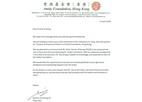The World Economic Forum is currently observing China for ideas on how governments can appropriately regulate the technologies of the future.
The organization, which runs the annual conference of world leaders in Davos, Switzerland, last January 2018, has announced this Wednesday that it is launching a hub in Beijing for government officials, businesses and academics to visit and come up with suggestions for future policies on developments such as artificial intelligence.
The group in the communist country will mark the third location of the Center for the Fourth Industrial Revolution, which opened in San Francisco in March 2017. A location in Tokyo launched in July, and another is due to open in Mumbai, India, in October this year. Areas of focus include blockchain, internet of things technology, and artificial intelligence.
"We can't use 20th century models for 21st century technology," Murat Sonmez, head of the organization's Center for the Fourth Industrial Revolution, said in an interview.
"We have a lot to learn from China as well," he said. "China represents a huge opportunity for the rest of the world to see what's coming."
While China is one of the most controlling states in the world, the national government has let some sectors, such as internet companies thrive relatively unrestricted.
In addition, under a "Made in China 2025" plan, Chinese authorities are investing deeply in technologies such as artificial intelligence in a bid to become a world leader in advanced tech.
A list of those who will take part in the Beijing hub was not immediately available because the group is still in early stages of development. However, two Chinese companies are already involved with the center's San Francisco hub: telecom giant Huawei and drone maker DJI.
Sonmez said he is anticipating that the hubs can complete several pilot programs within 18 months to help form guidelines for future policies, such as data privacy, liability for algorithm-generated actions and cross-border data flows.
"There's a potential if you do not have flexible regulation, all these investments will not lead to [a] desired outcome," he said.








